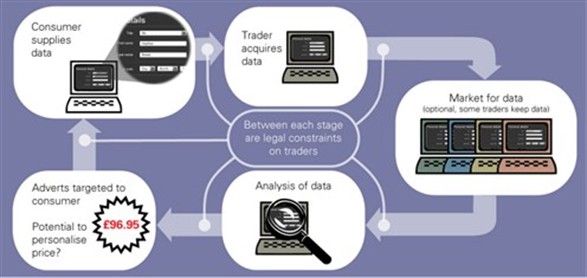OFT Warning on Cookies for Personalised Pricing
The Office of Fair Trading (OFT) appears to be taking a more proactive approach to reminding businesses of their obligations under the cookie law, than the UK’s official enforcer of the cookie regulations, the ICO.
A new report, following an investigation started in November 2012 and which included looking at the use of cookies, has concluded that poor levels of information in cookie notices and privacy policies is potentially damaging to consumer trust, and could lead to unfair practices.
“Transparency, the ability to opt-out of the collection of information and understanding are crucial to developing and maintaining trust in online markets.”
The report highlights what the OFT believes are a number of clear failings in cookie notices on leading UK retail websites. This includes:
- lack of detail in what information is collected and how it is used
- significant differences between the cookies disclosed by sites, and those found by investigators
- no ability for people to easily opt-out of data collection, if at all.
All of these are key elements of cookie law compliance, and it appears the OFT feels there is a lot of room for improvement here.
The inference in the report is that a tokenistic compliance with the cookie law means that its potential benefits in terms of creating better transparency and control, and therefore developing consumer trust, are not being realised.
“..our most significant concern currently is the potential for personalised pricing to harm consumers by leading to a reduction of trust in online markets”
The ICO has come under a lot of criticism from various sources since the introduction of the cookie law for its lack of enforcement activity, which is leading to a lot of current market confusion. Although the OFT report does not explicitly criticise the ICO, they have passed on their findings and made it clear they will be looking to work with them further on the issue.
They have also written to the UK’s top online retailers advising them to improve their transparency, and to make clear they will not refrain from enforcement where they find misleading or unfair practices.
About Personalised Pricing
Personalised pricing, while not unique to the web, has long been a much celebrated feature of online commerce.
The practice relies largely on using cookies to track visitors and identify distinguishing characteristics as the basis of presenting different people with different prices for the same product. This typically includes information like previous purchase history or behaviour on the site itself, but it can potentially also include data about the device they are using, the site they arrived from, physical location, and general profile data gathered by the individuals browsing history on unrelated websites.

Of course, this can be beneficial to both consumers and retailers – enabling discount incentives for either new, returning, or just desirable customers. Indeed, all evidence suggests that such practices have had consumer benefits.
However, when you have differential pricing on a large scale there is almost inevitable concern that some people may get treated unfairly. There have been many claims that some businesses are using various tracking methods, including cookies, to manipulate prices upwards for some consumers. The OFT investigation did not uncover specific instances of this, but recognises that the potential for it to happen is there, given the ‘right’ set of circumstances.
Those circumstances are most likely to arise where there are significant imbalances of power between business and consumer, and of course this easily arises out of an imbalance of information. This is the probably the key reason that there is so much importance placed on transparency in the report – because it helps to balance the power relationship.
It also serves to reassure consumers that what some fear might be happening in fact isn’t, and this can only be good for confidence in the market. And consumer confidence is something that most people would agree we could with a lot more of right now.
Recent Posts

January 13, 2017
Future of EU Cookie Compliance Webinar: ...
GDPR and now the proposed E-Privacy Regulation mean a stricter regime for cookie compliance, web governance and use of online tracking technologies. Join p...
View Article →
December 14, 2016
Draft EU ePrivacy Regulation Leaked...
A draft of the proposed legislation to replace the outdated EU ePrivacy Directive was leaked on the Politico.eu (PDF) website this week. The proposal is fo...
View Article →
November 3, 2016
GDPR Compliance Means Cookie Notices Mus...
Are you one of those people that ticked the cookie law box ages ago and not thought about it since? Well the game has changed and now is the time to re-vis...
View Article →
September 21, 2016
Optanon Acquired by OneTrust...
We are pleased to announce that Optanon, along with parent company Governor Technology, has been acquired by OneTrust....
View Article →